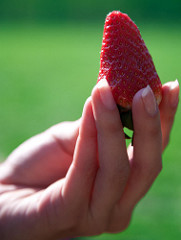
Athletes, in particular, need to focus on what they put into their bodies. Whether you are a weekend or a professional athlete, you take great pains to make sure that everything you eat meets the requirements of a healthy, balanced diet.
As an athlete, you need a healthy diet because you are keenly aware of how your body looks. But, just as or more importantly, you want to make sure that every calorie counts toward your workouts and competitions.
Here are some tips for a healthy diet for athletes:
1. Avoid junk foods
A healthy diet for athletes does not mean you have to eat only foods that are “good for you.” In fact, the occasional cookie, chip or hamburger, can actually be a nice treat. However, on the whole, junk food needs to be very low on your list of food priorities. Junk foods are generally full of trans-fats, white sugar, and white flour. Your workouts do not need the calories. And, you know that when you eat junk food, it weighs you down. Not only do your workouts not go nearly as well, but when you eat junk food you just generally do not feel as good.
2. Match you caloric intake to your activity
If your idea for a healthy diet is inspired by two parallel goals – losing weight and performing better athletically – you need to make sure you do not reduce your caloric intake so much that you are not able to fuel your workouts or competitions. For non-athletes, the bare minimum daily caloric intake should be 1,200 to 1,500 calories. However, for athletes, you will need to greatly increase your caloric intake if you are working out regularly. You may need to take in 2,000, 3,000 or more calories per day if you are working out heavily – even if you are on a diet.
3. Keep your diet as varied as possible
When you embark upon your new diet, you may be initially tempted to find a few foods you like a lot and stick with them always, day in and day out. However, there are two reasons why you will want to avoid eating the same small set of foods each day. First, you will get bored with this diet very quickly and likely quit your diet too early. Second, having the same foods every day does not give your body the opportunity to absorb the variety of nutrients from different foods it needs to be healthy.
4. Eat three meals, plus snacks, as needed
Plan your new diet around three solid meals per day. If you find you need more food than you can eat in three meals due to heavy workouts that burn a lot of calories, work in one or more snacks throughout your day.
5. Include a variety of foods, including pastas, eggs, fruits and vegetables
Your body requires a variety of nutrient sources. Happily, there is a wealth of options available to you. A healthy diet for athletes should include a mix of the following foods: legumes (e.g., beans), pastas, lean meats (e.g., ham), vegetables (e.g., tomatoes, cucumbers, celery, carrots, cabbage, mushrooms, spinach, cauliflower, potatoes, peas), fruits (e.g., melon, apple, bananas, grapes) vegetable soup, fish, whole-grain breads (e.g., brown bread), cheese (e.g., cottage cheese, low-fat spread cheese), brown rice, and dairy (e.g., yoghurt, skimmed milk). And, be sure to drink plenty of water: 8-16 glasses per day.
As an athlete, you owe it to yourself to fuel your body with the best foods you can find. You will feel better, look better, and perform better in the gym and on the field.
You must be logged in to post a comment
THIS WEBSITE is a participant in the Amazon Services LLC Associates Program, an affiliate advertising program designed to provide a means for sites to earn advertising fees by advertising and linking to [amazon.com].
Copyright @ 2014 - WALL STREET. Designed by Webriti